
Bertrand Arthur William Russell, 3rd Earl Russell, was a British philosopher, logician, mathematician, and public intellectual. He had influence on mathematics, logic, set theory, and various areas of analytic philosophy.

Dora Winifred Russell, Countess Russell was a British author, a feminist and socialist campaigner, and the second wife of the philosopher Bertrand Russell. She was a campaigner for contraception and peace. She worked for the UK-government-funded Moscow newspaper British Ally, and in 1958 she led the "Women's Peace Caravan" across Europe during the Cold War.

Bernard Bosanquet was an English philosopher and political theorist, and an influential figure on matters of political and social policy in the late 19th and early 20th centuries. His work influenced but was later subject to criticism by many thinkers, notably Bertrand Russell, John Dewey, William James and Ludwig Wittgenstein. Bernard was the husband of Helen Bosanquet, the leader of the Charity Organisation Society.

Conrad Sebastian Robert Russell, 5th Earl Russell,, was a British historian and politician.
Logical atomism is a philosophical view that originated in the early 20th century with the development of analytic philosophy. It holds that the world consists of ultimate logical "facts" that cannot be broken down any further, each of which can be understood independently of other facts.
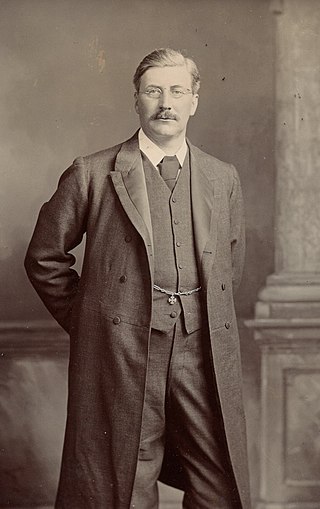
John Francis Stanley Russell, 2nd Earl Russell, known as Frank Russell, was a British nobleman, barrister and politician, the elder brother of the philosopher Bertrand Russell, and the grandson of John Russell, 1st Earl Russell, who was twice prime minister of Britain. The elder son of Viscount and Viscountess Amberley, Russell became well known for his marital woes, and was convicted of bigamy before the House of Lords in 1901, the last peer to be convicted of an offence in a trial by the Lords before that privilege of peerage was abolished in 1948.
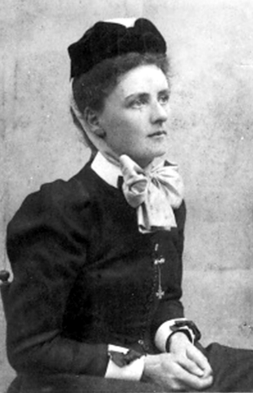
Alyssa Whitall "Alys" Pearsall Smith was an American-born British Quaker relief organiser and the first wife of Bertrand Russell. She chaired the society that created an innovative school for mothers in 1907.
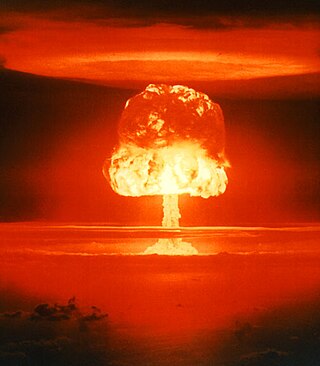
The Russell–Einstein Manifesto was issued in London on 9 July 1955 by Bertrand Russell in the midst of the Cold War. It highlighted the dangers posed by nuclear weapons and called for world leaders to seek peaceful resolutions to international conflict. The signatories included eleven pre-eminent intellectuals and scientists, including Albert Einstein, who signed it shortly before his death on 18 April 1955. Shortly after the release, philanthropist Cyrus S. Eaton offered to sponsor a conference—called for in the manifesto—in Pugwash, Nova Scotia, Eaton's birthplace. The conference, held in July 1957, became the first of the Pugwash Conferences on Science and World Affairs.
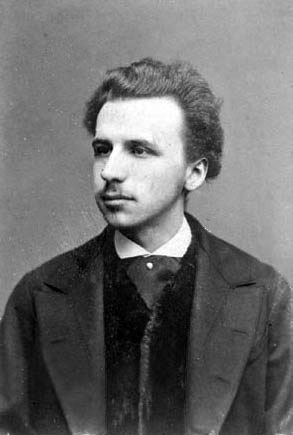
John Russell, Viscount Amberley, was a British politician and writer. He was the eldest son of John Russell, who twice served as Prime Minister of the United Kingdom, and father of the philosopher Bertrand Russell. Amberley is known for his unorthodox views on religion and for his active support of birth control and women's suffrage, which contributed to the end of his short career as Liberal Member of Parliament.
Adrien Bertrand was a French novelist whose short career was punctuated by a series of striking surrealist anti-war novels, written as Bertrand lay dying from complications involved in a wound he suffered whilst serving with the French Army in the First World War.
The aspects of Bertrand Russell's views on philosophy cover the changing viewpoints of philosopher and mathematician Bertrand Russell (1872–1970), from his early writings in 1896 until his death in February 1970.
Aspects of philosopher, mathematician and social activist Bertrand Russell's views on society changed over nearly 80 years of prolific writing, beginning with his early work in 1896, until his death in February 1970.
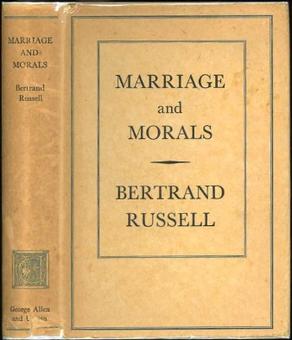
Marriage and Morals is a 1929 book by philosopher Bertrand Russell, in which the author questions the Victorian notions of morality regarding sex and marriage.

British philosophy refers to the philosophical tradition of the British people. "The native characteristics of British philosophy are these: common sense, dislike of complication, a strong preference for the concrete over the abstract and a certain awkward honesty of method in which an occasional pearl of poetry is embedded".

An anti-war movement is a social movement, usually in opposition to a particular nation's decision to start or carry on an armed conflict. The term anti-war can also refer to pacifism, which is the opposition to all use of military force during conflicts, or to anti-war books, paintings, and other works of art. Some activists distinguish between anti-war movements and peace movements. Anti-war activists work through protest and other grassroots means to attempt to pressure a government to put an end to a particular war or conflict or to prevent one from arising.
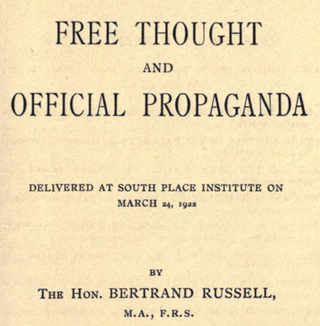
"Free Thought and Official Propaganda" is a speech delivered in 1922 by Bertrand Russell on the importance of unrestricted freedom of expression in society, and the problem of the state and political class interfering in this through control of education, fines, economic leverage, and distortion of evidence.

Francis Albert Rollo Russell was an English meteorologist and scientific writer. Russell was also an alternative cancer treatment advocate who promoted the idea that cancer is caused by excessive consumption of meat, alcohol, coffee and tea.
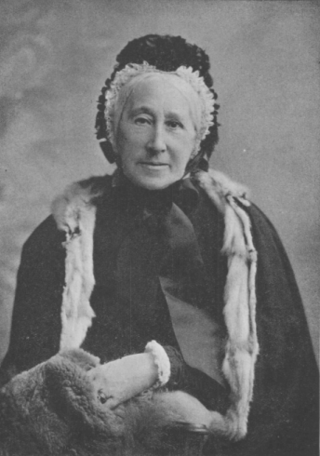
Frances Anna Maria Russell, Countess Russell, was the second wife of two-time Prime Minister of the United Kingdom John Russell, 1st Earl Russell. Between 1841 and 1861 she was known as Lady John Russell.

The 1950 Nobel Prize in Literature was awarded the British philosopher Bertrand Russell (1872–1970) "in recognition of his varied and significant writings in which he champions humanitarian ideals and freedom of thought." He is the fourth philosopher to become a recipient of the prize after the French analytic-continental philosopher Henri Bergson in 1927, and was followed by the French-Algerian existentialist Albert Camus in 1957. He is also the fifth British author to be awarded.